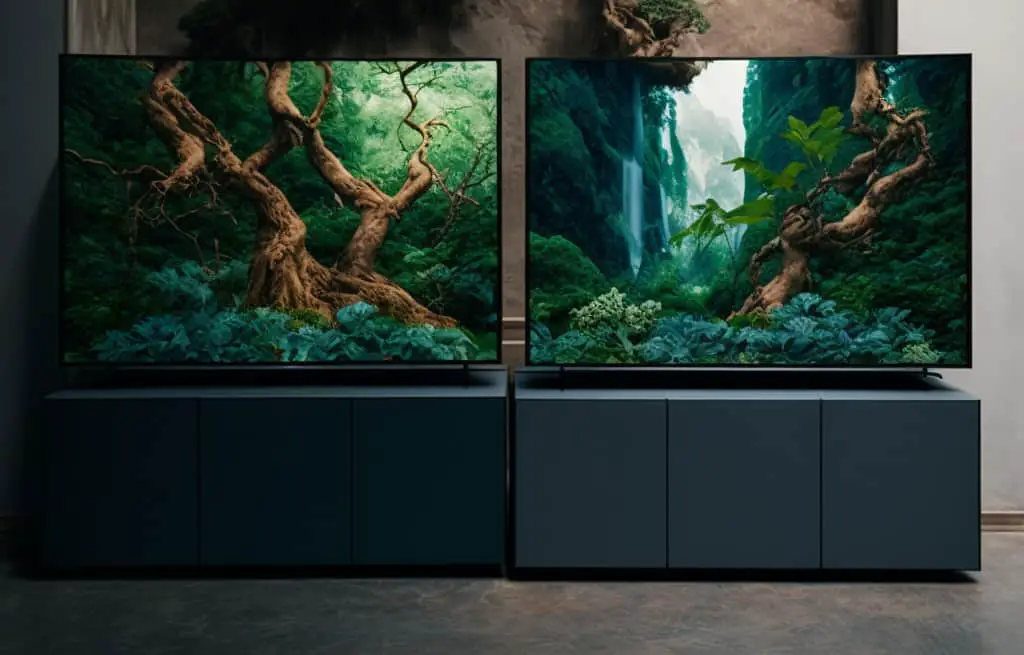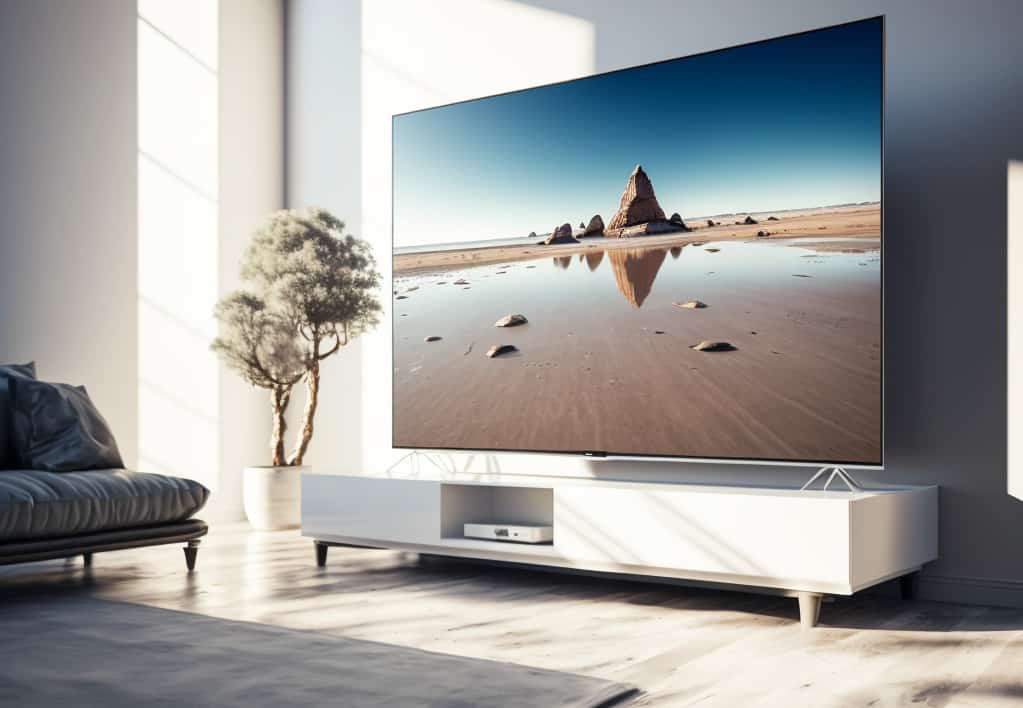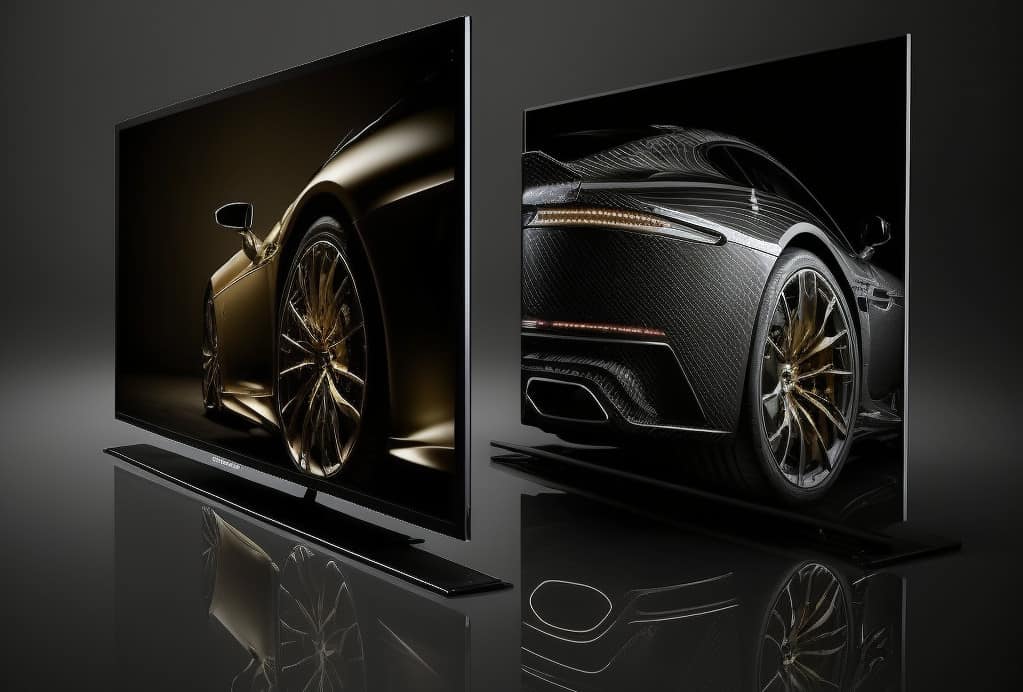Post content:
QLED vs OLED: Detailed comparison of the two leading TV technologies

When buying a new television, two of the main technologies you will find are QLED and OLED. Both offer their own advantages and features, but how do you know which is the best option for you?
We are going to make a comparison between a QLED and OLED television, so that after reading this article you can decide which one is best for you.
What is QLED and what does it offer?
QLED is the acronym for "quantum dot LED". It is a type of LED (light-emitting diode) display that uses quantum dots to produce more vivid and accurate colors. Quantum dots are tiny semiconductor particles about 1,000 times smaller than the width of a human hair.
When light passes through these quantum dots, they emit specific wavelengths based on their size. This allows QLED TVs to produce a wider range of colors, resulting in a more realistic and vivid image.
One of the main advantages of QLED technology is the ability to achieve very high brightness levels. Since QLED TVs use LED backlighting, they are capable of much higher peak brightness than OLED TVs.
This is especially important for HDR (high dynamic range) content, as it allows for greater detail and contrast in the brightest areas of the image. However, the fact that it does not have such pure black makes dark scenes look worse than on an OLED TV.
QLED TVs are also capable of maintaining their brightness levels over time, since quantum dots do not degrade like the organic materials used by OLEDs, which lose brightness over time.
What is OLED technology?
OLED stands for “organic light-emitting diode.” Unlike QLED TVs, which use a backlight to produce an image, OLED TVs have pixels that can be turned on and off individually. This allows for perfect black levels and an infinite contrast ratio, as each pixel can be completely turned off when displayed in black.
OLED TVs are known for achieving "pure blacks" and excellent image quality thanks to the infinite contrast they offer. Since each pixel can be turned off individually, there is no light bleeding or haloing around objects, resulting in an image with fewer distractions.
OLED TVs also have a wide viewing angle, meaning the picture quality remains consistent regardless of the angle you're viewing it from.
QLED vs OLED: Which technology is better in each situation?
Now that we have talked about the basic aspects of QLED and OLED technology, let's see which is the best option for the different situations that may arise.
Depending on use (Gaming, Multimedia)
gaming
Both QLED and OLED TVs can be good options for gaming.
OLED TVs usually have a higher refresh rate, which can make fast-paced games smoother and more responsive.
OLED televisions They enjoy less input lag, meaning there is less delay between when a button is pressed and when the action is displayed on the screen.

So if you are a casual gamer, either technology may be sufficient, but if you are a competitive gamer or prefer fast-paced games, OLED may be the better option.
Multimedia content
If you like movies, OLED televisions may be the solution. Because they can produce perfect blacks and an infinite contrast ratio, they are able to display a more cinematic image with greater detail and realism.
QLED TVs, while still capable of producing good picture quality, may not offer the same level of depth and contrast as OLED TVs.

Nevertheless, High-end QLED TVs are capable of delivering a better picture during the day and bright scenes Thanks to having a higher peak brightness, this is a relevant factor if you do not normally watch movies or shows at night, since a QLED would offer a better image in this case.
Depending on budget and Energy Efficiency
Budget
If price is an important factor in your decision, QLED TVs may be the most affordable option.
There are some QLED TVs available at lower prices. It's important to note, however, that you may have to give up features or performance if you opt for a cheaper QLED TV.
Energy efficiency
If you are concerned about energy efficiency, OLED TVs may be the best option. Although QLED TVs are typically more energy efficient than traditional LED TVs, OLED TVs consume even less energy.
This is because OLED TVs do not need a backlight, as each pixel produces its own light. However, it is important to note that the difference in power consumption between QLED and OLED TVs is usually small and may not be significant in the long term.
Ultimately, the best option for you will depend on your specific needs and preferences. It is important to consider all the factors important to you and do your own research before making a decision.
Depending on the room (Brightness)

Bright room
If you are going to use your TV in a bright room, QLED may be the best option. As we mentioned before, QLED TVs have a higher maximum brightness level, which allows them to better combat reflections and glare.
OLED TVs, on the other hand, can struggle in bright rooms due to their lower brightness levels.
Low light room
If you are going to use the TV in a dark room, OLED is going to be the best option.
Because OLED TVs can turn off individual pixels, they are capable of producing perfect blacks and an infinite contrast ratio. This results in a more detailed and realistic image, especially when watching movies or television shows with many dark scenes.
QLED TVs, while still capable of producing good black levels, cannot achieve the same level of detail and contrast as OLED TVs.
Conclusion
In conclusion, both QLED and OLED technology have their own strengths and weaknesses. QLED TVs offer high brightness and good color performance, while OLED TVs have excellent contrast and deep blacks, but lower brightness. Although both technologies can produce high-quality images, the best option will depend on your specific needs and preferences.
Whether you're a movie fan, a fan of video games, or simply looking for a high-quality TV, it's important to do your research and take all factors into account before making a decision. Ultimately, either technology can be a great choice, but it's important to find the one that best suits your needs and budget.
We hope that this comparison between OLED and QLED TV technologies has helped you have a clearer understanding of both, and that this translates into you making the best purchase possible.
What should I look for when buying a TV?
If you want to know more about televisions and all the specifications they have, don't forget to take a look at this article
«TV buying guide: How to find the perfect option»

